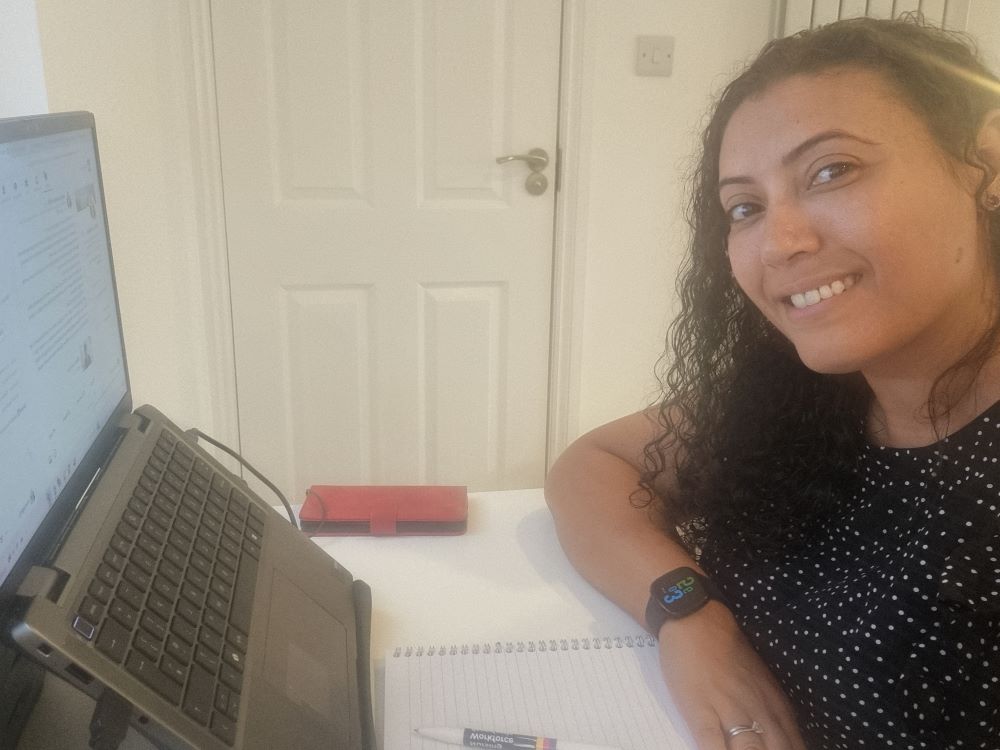Online Advanced Policing Practice MSc
Postgraduate degree
Advance your policing career with our fully online MSc in Advanced Policing Practice. Designed for policing professionals, this flexible programme will equip you with the leadership skills and expertise to drive evidence-based, ethical, and strategic change in modern policing.
- Develop the skills and knowledge to advance your policing career
- Supported online learning gives you the flexibility to fit study around the demands of operational work and life commitments
- Learn from expert staff who will guide your research interests and career development
- Ideal if you are working or have experience within policing or an aligned sector
- Be part of the University of the Year (THE)
About your online policing master’s degree
Course highlights
- Critically understand how policing, criminology, and justice intersect to inform complex decision-making
- Apply modern policing strategies to tackle evolving operational challenges
- Analyse and apply evidence-based research to improve policy and practice
- Use contemporary theories to enhance responses to victims and vulnerable individuals
- Apply your learning directly to your role
- Choose an optional module related to your specific area of interest
How you'll study
This course is studied 100% onlineStudy over 2 years
Start in January, May or September
26th March 2026
Fees: £8,600
Free online Policing Master's Degree briefing sessions
Join our Police Education team to find out about the online MSc Advanced Policing Practice starting in May 2026.
- 11 March at 1pm
- 8 April at 6pm

Course overview
Our MSc Advanced Policing Practice has been created for policing professionals who want to deepen their expertise and/or take the next step in their policing career. Delivered fully online, it offers the flexibility to balance study alongside the demands of operational work.
You’ll explore the latest thinking in policing, criminology and criminal justice, focusing on evidence-based practice, ethical leadership, vulnerability and risk, equality and inclusion, and research methods. Each topic is designed to help you address the challenges facing modern policing while strengthening your ability to think critically and strategically.
The policing master’s degree is structured to support your continuing professional development, with assessments that link directly to your role.
You’ll have the opportunity to apply your learning in practice, developing insights and solutions that make a real difference in your professional context.
By the time you graduate, you’ll have the skills, knowledge and confidence to lead change and influence policy, supporting progression into senior roles across policing and wider public protection.
Please refer to the modules section to get a full description of what you’ll cover in each module.
Modules
Ethical Leadership
This module lays the foundation for leadership development within professional policing by equipping learners with the knowledge, skills, and frameworks essential for effective practice. It explores key leadership theories and their application to real-world policing challenges, including command structures (Bronze, Silver, Gold), strategic tools like the National Decision Model (NDM) and THRIVE, and the influence of ethical, inclusive leadership on public confidence and organisational culture. You will critically examine decision-making under pressure, multi-agency collaboration, and the role of leaders in coaching, mentoring, and officer wellbeing. The module also fosters personal reflection on leadership identity and values, while developing core academic and professional skills such as critical thinking, evidence-based decision making, and effective communication to support ongoing development throughout the MSc programme.
Debates in Contemporary Policing
This module takes a critical look at the key debates shaping contemporary policing in the UK. You’ll examine themes such as professionalisation, Code of Ethics, transparency, accountability, and policing culture, as well as exploring different models and approaches to policing in practice.
In the second half of the module, the focus shifts to emerging criminological trends. Topics include crime mapping, hate crime, crimes of atrocity, victimology in the digital age, and environmental crime. Content is regularly refreshed to ensure you're engaging with the latest issues and debates.
Through the assessment strategy, you’ll apply criminological theory to real-world challenges, developing evidence-based insights and practical solutions that can inform and strengthen professional practice.
Research Methods - Evidence-Based Policing
This module introduces the core research methods underpinning evidence-based policing. It equips you with the knowledge and skills required to design and conduct qualitative, quantitative, and mixed-methods research. The module begins with key foundations such as research design, engagement with academic literature, and research philosophies, before exploring specific methodologies including Randomised Control Trials, interviews, surveys, systematic reviews and meta-analysis.
This module introduces the core research methods that underpin evidence-based policing. You’ll build the knowledge and skills needed to design and carry out qualitative, quantitative and mixed-methods research.
The module begins by exploring key foundations, such as research, design, engagement with academic literature and research philosophies, before moving on to specific methodologies including Randomised Control Trials, interviews, surveys, systematic reviews and meta-analysis.
By the end of the module, you’ll be prepared to apply robust research approaches to real-world policing challenges and to design studies that can inform and strengthen professional practice.
Postgraduate Major Project
This module provides you with the opportunity to undertake an independent research project underpinned by the principles of Evidence-Based Policing. Working in collaboration with academic supervisors and, where appropriate, police force partners, you will conduct either primary or secondary research on a topic of relevance to the wider Criminal Justice System. In most cases, this project will extend from the research proposal developed during the Research Methods and Evidence-Based Policing module.
The module is designed to develop and demonstrate advanced skills in research design, project management, critical analysis, and academic writing. You will be expected to formulate significant and original research questions, engage critically with appropriate methodologies and theoretical frameworks, and construct well-reasoned arguments based on complex or potentially contradictory evidence.
Through this work, you will deepen your specialist knowledge, refine your ability to interpret and challenge existing literature, and, where appropriate, contribute new insights or perspectives to the field. The module also supports the development of clear, structured, and coherent academic writing, suitable for professional and academic audiences.
You must have successfully completed 120 credits of taught modules before undertaking this module.
This module gives you the opportunity to design and deliver an independent research project, guided by the principles of Evidence-Based Policing. Working closely with your academic supervisor and, where appropriate, in collaboration with police force partners, you’ll investigate a topic that has relevance to the wider Criminal Justice System. In most cases, your project will build on the research proposal you developed in the Research Methods and Evidence-Based Policing module.
You’ll strengthen advanced skills in research design, project management, critical analysis and academic writing. As part of this, you’ll be expected to frame significant original research questions, apply appropriate methodologies and theoretical frameworks, and develop arguments that respond to complex or even conflicting evidence.
Through the process, you’ll refine your ability to interpret, evaluate and challenge existing literature, while also deepening your specialist knowledge. Where possible, your project may generate new perspectives or insights that contribute to the field. The module also supports the development of clear, structured writing suitable for both professional and academic audiences.
Optional modules
You’ll be required to complete one optional module.
Terrorism and Counter Terrorism Theory
In this module, you’ll build a strong theoretical foundation in terrorism and counter-terrorism. You’ll explore both global and UK specific models, looking at tactics, recruitment, financing and the links between organised crime and terrorism.
You’ll examine the evolving role of UK policing with national and international counter-terrorism efforts and analyse threats from groups and movements including Islamic fundamentalism, right-wing extremism, the incel/manosphere, and environmental terrorism.
Through real-world case studies of proscribed groups, you’ll compare different ideologies, identifying both similarities and differences, while developing the critical insight needed to understand and respond to today’s complex security challenges.
Transnational and Organised Crime
This module examines the history and current landscape of transnational and organised crime, covering areas such as drug and human trafficking, digital crime, organised networks and terrorism. You’ll trace its origins in piracy and smuggling before analysing the complex international criminal challenges facing the UK and the wider world today.
Throughout the module, you’ll engage critically with evidence-based policing approaches and explore the importance of international and multi-agency cooperation in tackling these issues.
Vulnerability and Safeguarding in the Digital Space
This module explores the evolving risks children face in online spaces, from exposure to harmful content and bullying to exploitation through gaming, social media and messaging platforms. Drawing on the latest research, it highlights the urgent need for proactive strategies that address both safety and privacy concerns.
You’ll examine current evidence, identify gaps in knowledge and critically analyse how the UK and international communities are responding to these challenges. The module also introduces the ‘Safety by Design’ approach, which focuses on creating safer digital environments for children and supporting the work of policing and education professionals.
Modules are subject to change and availability.
Assessment
How you'll study
Our MSc Advanced Policing Practice is studied 100% online.
You’ll study through Canvas, our world-class online Learning Management System (LMS), which can be accessed from your phone, PC, or tablet, both at home or on the move. Canvas provides instant access to study materials, forums, and support from tutors and classmates, as well as enabling easy submission of your assignments.
On successful completion of your online policing master’s degree, you’ll be invited to attend a graduation ceremony on campus. If attending the ceremony in person is not possible then we’ll arrange to have your certificate sent to you.
Supported distance learning
We understand that distance learning is different to traditional campus study and if you’re new to online study you may have concerns or apprehensions about studying your masters in policing MSc course, and that’s natural.
To help put your mind at ease we have a dedicated Distance Learning Support Team to help and support you throughout your time at ARU, starting with your first online induction and staying with you right through to graduation. In addition, you’ll also be supported by specialist tutors who are experienced in supporting distance learning students and will provide you with the support you need throughout your studies.
Once you start your online Advanced Policing Practice MSc, we encourage the creation of online communities and many of our learners find these connections with others invaluable, helping them to stay motivated, share concerns or make new friendships.
Contact us to talk through any questions or concerns or visit our support page for more information about the support services available.
Be part of the University of the Year
We're proud to be the Times Higher Education (THE) University of the Year 2023.
The prestigious THE awards honour ’exceptional performance during the 2021-22 academic year, and reflect ARU’s success in delivering high-impact projects during this period, despite the challenges of the Covid-19 pandemic.
The award recognises the difference we make in the region and our communities – while also acknowledging the broader impact of our world-leading research, and the contributions our students and graduates make to society.

Careers with an online policing master’s degree
What could MSc Advanced Policing Practice do for my career?
This master’s in Advanced Policing Practice is ideal for serving professionals in UK policing or aligned industries. It's right for those with career advancement in mind either now or the future. It supports continued professional development, enhancing your critical thinking, research capability, and ethical leadership.
The course provides a recognised postgraduate qualification that complements operational experience. You may be able to use it as evidence of CPD to support promotion or progression. With a focus on strategic insight, evidence-based practice, and ethical leadership, you'll be ready for senior roles and leadership responsibilities within the police service.
You'll benefit from the flexible distance learning format. Enabling you to integrate study with your work, ensuring immediate relevance and impact in practice.
What job roles can I consider with an MSc Advanced Policing Practice?
With an MSc Advanced Policing Practice, graduates can consider roles in research, academia, investigations, intelligence, operations support, criminal justice, as well as other specialist policing roles (roads, neighbourhood, response).
What skills will I get from an online Advanced Policing Practice MSc course to help my career?
Choosing to study an MSc Advanced Policing Practice degree will give you many transferable skills. Here are some of them:
- Critically explore complex policing issues, drawing on advanced theory, research, and professional experience.
- Use ethical reasoning and reflective practice to evaluate decision-making at both personal and organisational levels.
- Plan and carry out independent research using appropriate methods to inform policing policy and practice.
- Present clear, well-supported arguments, showing confident communication and critical judgement.
- Take responsibility for your own learning and professional development, adapting your knowledge and skills to meet emerging challenges in policing.
What can I study after an Advanced Policing Practice MSc?
Depending on your long-term goals and interests you may decide to explore a doctorate qualification with further research opportunities. Having a master’s degree under your belt is a key entry requirement in opening doors to study at this level.
Careers Advice Service
Once you become an ARU student you will be able to access our Employability service to help you whatever stage of your career, whether that’s landing your dream job or the next progression step.
We offer:
- careers advice, including one-to-one online and telephone appointments with our experienced advisers
- help with your CV, job searches, applications, and interview preparation
- an online portal packed with useful careers resources
- our Employability Programme, which helps you hone the skills employers say they want in graduates.
Entry requirements for our online policing master’s degree
- Applicants will normally hold a first or second-class Honours degree in a relevant policing-related subject. Graduate applicants from an unrelated field, but who can demonstrate substantial relevant professional experience, will also be considered. You will have normally worked for over 3 years in a relevant professional environment.
- In addition, applicants should be currently or previously employed within policing or an aligned sector.
- If English is not your first language, you will be expected to demonstrate a certificated level of proficiency of at least IELTS 6.5 or equivalent English Language qualification as recognised by ARU.
- As a distance learner, you'll also need a suitable computer with internet connection, together with sufficient IT competence to make effective use of our online Learning Management System (LMS) with high-speed internet and email.
Important additional notes
Our published entry requirements are a guide only and our decision will be based on your overall suitability for the course as well as whether you meet the minimum entry requirements. Other equivalent qualifications may be accepted for entry to this course, please contact us for further information.
Tuition fees and funding options
Fees
The full tuition fee for our MSc Advanced Policing Practice degree is £8,600.
The tuition fees you pay each year for the online policing master’s degree will be £4,300. The course is studied over 2 years.
Accreditation of Prior Learning (APL) may reduce the tuition fees. This will be confirmed once your application has been submitted. Please note that APL may affect your eligibility for a postgraduate loan.
Funding
We offer payment by instalments, so you can spread the cost of studying with us.
For military students: You can use your ELCs towards this course. ARU is a recognised ELCAS provider (number 1007). Please contact your Learning Centre for details of ELC, eligibility and how to apply.
For more information on how you fund your studies please see our funding page.
What our students say
Balancing life, leadership, and learning: Melissa’s story






